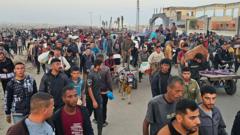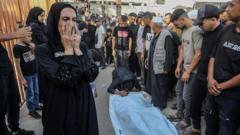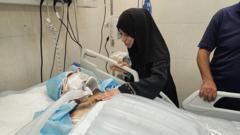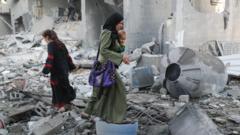With the al-Awda hospital empty, the region grapples with a healthcare collapse as efforts for a ceasefire remain tenuous.
**N. Gaza's Last Hospital Evacuated Amid Ongoing Israeli Offensive**
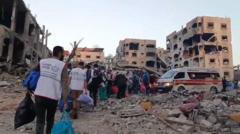
**N. Gaza's Last Hospital Evacuated Amid Ongoing Israeli Offensive**
The final medical facility in North Gaza ceases operations following military orders, exacerbating the humanitarian crisis.
The last health facility delivering critical services in North Gaza has been forced to evacuate its patients following an Israeli military directive, as confirmed by the hospital's director. Dr. Mohammed Salha reported that the evacuation of al-Awda hospital in Jabalia occurred on Thursday evening after enduring "two weeks of siege." Currently, there is no healthcare provision in the northern region, as the Israeli Defense Forces (IDF) have yet to issue a response regarding this operation.
The evacuation unfolds amidst ongoing pursuits to establish a ceasefire. In a recent statement, Hamas indicated it was "thoroughly reviewing" a U.S. proposal that has reportedly received Israel's approval. U.S. President Donald Trump stated that a resolution seems "very close," yet Hamas expressed dissatisfaction with the plan, asserting it does not meet their fundamental conditions, specifically Israel's commitment to halting military operations. The proposed deal includes a two-month cessation of hostilities, in which Hamas would release hostages in stages, with significant prisoner exchanges and humanitarian aid to be facilitated by the United Nations.
In the latest developments, at least 72 individuals were killed in Gaza due to relentless airstrikes, according to Hamas-operated health sources. Dr. Salha described the dire situation as he initially resisted evacuation orders, prioritizing patient care, stating the forces threatened direct action if the orders were not followed.
After prolonged negotiations lasting seven hours, the hospital staff managed to transport patients over destroyed roads to ambulances positioned about 300 meters from the facility. Videos provided by staff depict the evacuation process amidst the chaos of the ongoing conflict.
With the closure of al-Awda hospital, the World Health Organization's Director-General, Tedros Adhanom Ghebreyesus, lamented the loss of a crucial lifeline for local residents, emphasizing the necessity of safeguarding civilians and healthcare workers. Previously, the IDF had noted operation activities in the area but denied knowledge of a siege around the hospital.
A coalition of 18 humanitarian organizations criticized the repeated assault on al-Awda, indicating it had suffered substantial damage from military actions. United Nations’ reports reveal a significant deterioration in Gaza's healthcare system, with only a fraction of primary healthcare facilities and refugee health centers remaining operational.
While Israel has recently allowed limited humanitarian assistance into Gaza, chaos has ensued at distribution points. Critics, such as the head of Doctors Without Borders, dubbed the assistance plans ineffective and expressed concern that the most vulnerable populations would remain underserved.
International calls for increased aid access continue, with French President Emmanuel Macron urging collaborative action if Israel fails to improve its humanitarian response. Contrarily, Israel's foreign ministry dismissed claims of a blockade and defended its military strategy aimed at addressing security threats from Hamas.
The devastation caused by conflict since the initiation of hostilities on October 7, 2023, has left profound losses on both sides, with approximately 54,321 fatalities reported in Gaza amid escalating offensives. The urgency for a humanitarian solution and a viable ceasefire remains at the forefront as civilians continue to bear the brunt of the warfare.
The evacuation unfolds amidst ongoing pursuits to establish a ceasefire. In a recent statement, Hamas indicated it was "thoroughly reviewing" a U.S. proposal that has reportedly received Israel's approval. U.S. President Donald Trump stated that a resolution seems "very close," yet Hamas expressed dissatisfaction with the plan, asserting it does not meet their fundamental conditions, specifically Israel's commitment to halting military operations. The proposed deal includes a two-month cessation of hostilities, in which Hamas would release hostages in stages, with significant prisoner exchanges and humanitarian aid to be facilitated by the United Nations.
In the latest developments, at least 72 individuals were killed in Gaza due to relentless airstrikes, according to Hamas-operated health sources. Dr. Salha described the dire situation as he initially resisted evacuation orders, prioritizing patient care, stating the forces threatened direct action if the orders were not followed.
After prolonged negotiations lasting seven hours, the hospital staff managed to transport patients over destroyed roads to ambulances positioned about 300 meters from the facility. Videos provided by staff depict the evacuation process amidst the chaos of the ongoing conflict.
With the closure of al-Awda hospital, the World Health Organization's Director-General, Tedros Adhanom Ghebreyesus, lamented the loss of a crucial lifeline for local residents, emphasizing the necessity of safeguarding civilians and healthcare workers. Previously, the IDF had noted operation activities in the area but denied knowledge of a siege around the hospital.
A coalition of 18 humanitarian organizations criticized the repeated assault on al-Awda, indicating it had suffered substantial damage from military actions. United Nations’ reports reveal a significant deterioration in Gaza's healthcare system, with only a fraction of primary healthcare facilities and refugee health centers remaining operational.
While Israel has recently allowed limited humanitarian assistance into Gaza, chaos has ensued at distribution points. Critics, such as the head of Doctors Without Borders, dubbed the assistance plans ineffective and expressed concern that the most vulnerable populations would remain underserved.
International calls for increased aid access continue, with French President Emmanuel Macron urging collaborative action if Israel fails to improve its humanitarian response. Contrarily, Israel's foreign ministry dismissed claims of a blockade and defended its military strategy aimed at addressing security threats from Hamas.
The devastation caused by conflict since the initiation of hostilities on October 7, 2023, has left profound losses on both sides, with approximately 54,321 fatalities reported in Gaza amid escalating offensives. The urgency for a humanitarian solution and a viable ceasefire remains at the forefront as civilians continue to bear the brunt of the warfare.


